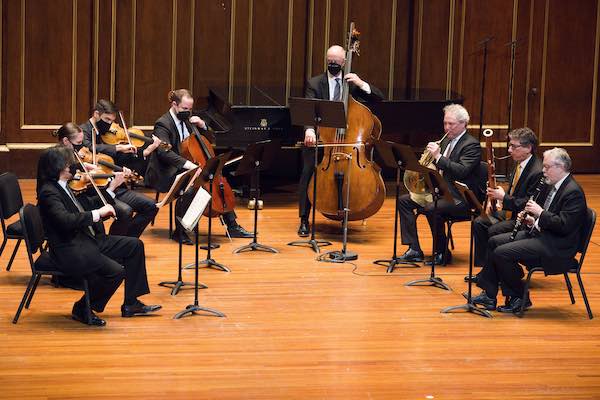Boston Symphony Chamber Players give voice to works by Hindemith and Wyner

The Boston Symphony Chamber Players performed Paul Hindemith’s Octet Sunday afternoon at Jordan Hall. Photo: Hilary Scott
After finding widespread popularity in the 1920s, Paul Hindemith seemed the voice of the future, his abstract and intricate music looking ahead to the mid-century avant-garde.
Yet by the 1950s the contemporary music establishment had largely left him behind. Hindemith resigned from Yale and moved to Zürich to live out the rest of his life. His music has since fallen into undeserved neglect. Even his Mathis der Maler symphony, once a concert staple, is a rarity on concert programs.
But Hindemith adhered to his unique aesthetic in his final works. His Octet for winds and strings, completed in 1958, recalls the prickly modernism of his youth.
Sunday afternoon at Jordan Hall, the Boston Symphony Chamber Players revealing the complex beauties from this attractive score.
At 25 minutes, the Octet is a marvel of contrapuntal interplay. But the music never quite settles into an equilibrium. Phrases combine in disjointed shapes and dissonances bite, mixing neo-Baroque energy with emotional objectivity. Hindemith also drew inspiration from Beethoven’s celebrated Septet, adding an extra viola to the otherwise similar instrumentation to bring a dark sonority.
The Chamber Players found the work’s sly humor and sense of grandeur. Clarinetist William R. Hudgins teased the sarcasm from the first movement’s jazzy riffs, with strings providing rich-toned counterbalance. The second movement variations, largely a play on accompaniment figures, showcased the ensemble in a delicate pointillistic display.
Elsewhere, the musicians explored the music’s bold contrasts. In the third movement, French hornist James Sommerville lofted a beaming line over the dusky strings, with cellist Blaise Déjardin and bassist Edwin Barker providing a solid anchor. The fourth movement coursed with urgency in its shifting meters, and the ensuing fugue went with assurance. The musicians found idiomatic flair in the ersatz waltz and brisk polka that brought the work to witty conclusion.
Yehudi Wyner’s Concord 7 offered an elegant complement to Hindemith’s music.
Scored for a septet of strings, winds, and piano, this 2020 work reveals its astringent lyricism through taut formal logic. The music unfolds in skittish style over thirteen minutes. Shards of melody that originate in the piano spread to the full ensemble, the music stopping and starting in bursts of energy. But the heart of the score explores sweeping textures and bold colors. Dissonances glisten against a warm oboe solo, providing momentary repose. The opening fury returns before the music concludes in a sudden calm.
Concord 7 stands as one of Wyner’s most intriguing recent works, and the Chamber Players, offering it for the second time since the November premiere, gave it bold advocacy. Gracious applause brought the composer to the stage for bows.
Mozart’s String Quintet in D, K. 593 rounded out Sunday’s program.
Written in 1790, this score is one of Mozart’s most introspective chamber works, with an overall tension foreshadowing Beethoven.
Playing with plush tone, the Chamber Players reveled in its lyrical warmth and intimacy. The Larghetto built gradually from Déjardin’s cello arpeggios, the ensemble’s ensuing phrases bestowing a distant glow. The musicians charted the ensuing Allegro with grace and intensity in equal measure.
Violinist Haldan Martinson and violist Cathy Basrak created a radiant musical dialogue in the Adagio. The Menuetto was tender, with the Trio offering bright-toned departure. The musicians rendered the buoyant finale with songlike resonance. The concluding fugue unfolded like a friendly conversation.
The Chamber Players will perform music by Glinka, Gubaidulina, Langer, and Shostakovich 3 p.m. April 10 at Jordan Hall. bso.org
Posted in Performances



